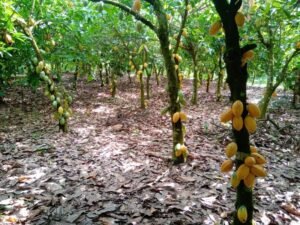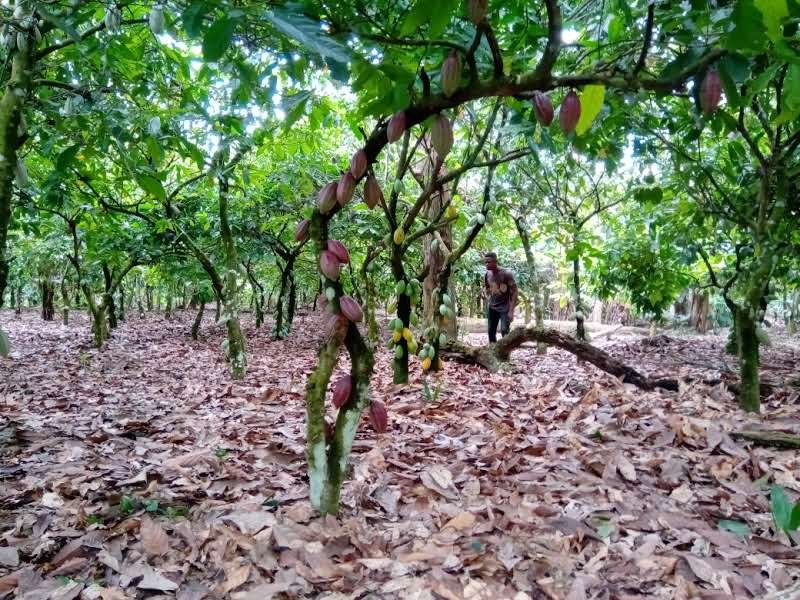Evidence of climate change surrounds us—from environmental degradation and floods to extreme and unpredictable weather. However, for Nigerian farmers, the consequences of climate change go beyond environmental concerns; they strike at the core of their livelihoods, writes Jumoke Olasunkanmi.
Climate change disrupts traditional weather patterns, impacting every aspect of farmers’ work, from planting to harvesting and preservation. The repercussions are severe, leading to low outputs that worsen existing challenges in agricultural communities and contribute to food insecurity in the country.
For cocoa farmer, Oluwapelumi Adedeji, the unpredictability of seasons affects his outputs in frustrating ways, making him contemplate quitting farming altogether. Adedeji explained to the African Health Report (AHR) that his cocoa farm has shifted from yielding during the rainy season to yielding only during the dry season, a significant change that has left farmers like him grappling with reduced productivity.
Adedeji, whose farm is located in Olomidudu, near the Osun/Ondo boundary, inherited it from his father and had dreams of expanding it. However, the uncertainties he faces now make him skeptical about realising his dream.

As seasons change, outputs continue to decline, leaving farmers with meager rewards for their efforts. The financial implications push more people away from farming as they seek more stable sources of income.
“I used to want to own my personal farm; I dreamt of it. But with the way things are now, I don’t think I want that anymore. What we are experiencing now is not palatable at all,” said Adedeji, expressing the demoralising impact of reduced yields.

He added that cocoa farmers face additional challenges as they cannot increase the price of their produce, as prices for the commodity are solely determined by the exchange rate.
Udochukwu Peter’s vegetable farm has faced similar ordeals. In an exclusive interview with AHR, he explained that the unpredictability of the weather leaves him unsure of the right time to plant. This year’s unexpected November rainfall at a period normally considered the dry season, resulted in a loss of seed worth over N900,000.
“The cost of maintaining the farm is on the high side now. Labour, chemicals, and transportation are all expensive. Yet, the weight rests on the shoulders of the farmers,” Adedeji added.
Udochukwu Peter’s vegetable farm has suffered similar ordeals. In an exclusive interview with AHR, he explained that the unpredictability of the weather means he is unsure of the right time to plant. He added this year’s dry season has been filled with unexpected rainfall which has resulted in a loss of seed worth over N900,000.

The rains have also forced him and other farmers to halt planting as he does not know if there will be more rainfall and he cannot afford to lose more seedlings.
“We are scared of planting more at the moment because if it rains more, it’s still going to result in losses and we’ll still have to scramble to find more money to plant again.”
He added that the disruption not just affects farmers but agribusiness owners who sell seeds too.
The impact of the rain is not limited to the farmland; the dilapidated roads leading to Peter’s farm in Agbowa area of Ikorodu, Lagos, have been worsened by the consistent rain, making it challenging for him to reach his farm in his pickup truck.
The Nigerian Meteorological Agency (NiMet) is responsible for providing adequate weather updates and information on climate-related matters in the country.
Information on NiMet’s website claims that they also offer ‘weather and climate services to farmers, herders, and fishermen to promote sustainable agricultural development, increase productivity and contribute to food security in Nigeria’.
In addition to the weather forecast, NiMet has a Crop Weather Calendar (CWC) that provides information and insights on the best time to plant and harvest in specific zones in the country. It also has an annual Seasonal Climate Prediction (SCP) that predicts the general weather outlook for the year.
For instance, NiMet had warned in January that in 2023, there would be early and prolonged rainfall, thunderstorm and flooding in different parts of the country.
The agency also has an Early Warning System through which it issues warnings to avert weather-related issues that could affect agriculture. It also explains weather anomaly.

On November 27, it explained that the unexpected rainfall (which was accurately predicted by NiMet) seen in several parts of the country on the 25th and 26th were as a result of an opening in the mid-latitude trough which pulled the Inter-Tropical Discontinuity (ITD) northward. It also noted that this occurrence is a result of changes in the Earth’s climate.
But many Nigerians, particularly farmers in rural areas, are not aware of these services. None of the farmers that AHR spoke with in the course of this article rely on forecasts from NiMet to plan their planting or harvests.
This underscores the importance for the Federal Government to ramp up enlightenment for farmers on utilising this service to help them cope with changing weather conditions that adversely affect their farm productivity.



